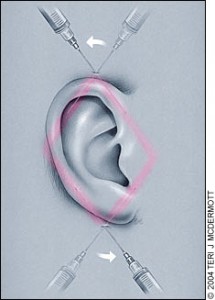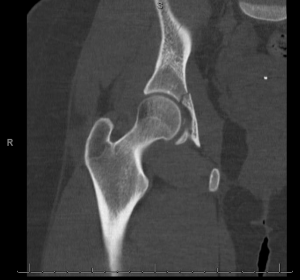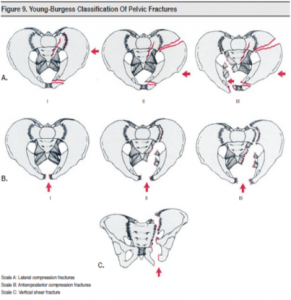Aortic Dissection is one of those diagnoses that gets everyone’s heart rates up (despite beta blockers), and its something we (should) think about in all of our blunt trauma patients. The proximal descending aorta is the great vessel most susceptible injury in blunt trauma, due to its relative mobility over the fixed abdominal aorta, which …
Category: Trauma
Jul 13
Ear Lacerations
Ear Lacerations: Pt. with a laceration through the helix of the ear with exposed cartilage 2 Point Ear Block: Am Fam Physician. 2004 Feb 1;69(3):585-590. Goal: Approximate cartilage with absorbable 5-0 monocryl. It’s ok to trim away small amount of jagged or devitalized skin or cartilage to ensure proper approximation. Close the skin over the cartilage with 5 …
Jun 20
Hip Pain and Negative Plain Films
Case: A young person presented following an MVC. Initial workup was negative including plain films of the chest and pelvis, however the patient had some tenderness over the right greater trochanter, and some pain with passive ROM, limiting movement overall. On tertiary exam in the ED, the patient was unable to bear weight on the …
Jun 04
Finger Thoracostomies
From teaching round–Courtesy of Mene Demestihas: In a patient in cardiopulmonary arrest, going through the H’s and T’s can lead us to suspect a tamponade or compressive physiology as the culprit of the arrest. In these patients placing a formal chest tube is generally frowned upon as it can be a labor-intensive process for a …
May 14
MTC Question
Patient with a forearm stab wound, small hematoma, neurvascularly intact…what workup would you do?
May 13
Case of the Month #4 Pelvic Fracture
EMory Files Case #4: Poly-Trauma Hx: 40’s yo M presents with auto v. pedestrian PE: VS: Manual BP 80/40, HR 140, B LE Open Deformities, 2+ in all 4, pelvis stable, GCS 7 (2, 2, 3) Poly-Trauma: ***Case Discussion of Polytrauma with Dr. Prest with Emory Trauma Surgery*** https://www.dropbox.com/s/jqqi8m3e1ng6xzd/Prest%20Polytrauma.MP3 Teaching Point #1: Problems with airway …



